This history of queer women in movie musicals was originally published in 2020. It has been updated to include more recent films and some older films we missed the first time.
Musicals are gay. So why aren’t more musicals gay?
From George Cukor to Jacques Demy to Rob Marshall, many of cinema’s greatest movie musicals were directed by queer men. But few of those films focused on gay characters — the genre simply offering an opportunity for queer aesthetic amidst heterosexual text.
There are some major exceptions — A Chorus Line, the fantastic and underappreciated Zero Patience — but even as stage musicals have become increasingly gay, the budgets required to make movie musicals have kept them largely straight. Queer people have remained underrepresented in this genre we sustain — and it’s especially true for queer women.
But that’s finally starting to change. From The Prom to The Color Purple to Emilia Pérez to the overt subtext of Wicked, we’re finally showing up in a wide range of movie musicals. To celebrate here is an exhaustive look at the representation of queer women in the history of movie musicals.
A History of Queer Women in Movie Musicals
1953 — Calamity Jane (dir. David Butler)

This Doris Day starring-musical is absolutely gayer than you’d ever imagine from a major Hollywood musical made in 1953. There’s subtext and then there’s… whatever is going on here. Jane fully checks out a woman’s ass, she moves in with a woman she clearly loves, and she feels butch even when she’s made femme. But while that’s all fun and good, the movie is also as racist as the least self-aware westerns of the time and manages to throw in some random transphobia. Certainly a product of its time and point of view, but any discussion of queer women in movie musicals would be incomplete without starting here.
1972 — Cabaret (dir. Bob Fosse)

Every iteration of Cabaret is super gay because Berlin in the early 30s was super gay. The most recent Broadway revivals have certainly upped the queer energy, but even the masterful film adaptation is inherently queer. There isn’t much in the film about queer women — unless you read bisexual energy into Sally Bowles which, hey, fair — but there is one number that’s explicit. “Two Ladies” finds Joel Grey’s Emcee playfully describing his throuple with, you guessed it, two ladies. Sure, he’s the focal point of the number, but who knows what’s happening under the sheet?
1975 — The Rocky Horror Picture Show (dir. Jim Sharman)

The Rocky Horror Picture Show is usually discussed in the context of Dr. Frank-N-Furter’s trans identity, but the fun thing about trans people is we can be queer too! And, oh boy, is Frank-N-Furter queer. Frank has a questionable rendezvous with Janet, he chases her around multiple times, and there’s also mention that Frank used to be with Columbia. Not to mention Columbia and Magenta being all over each other during “Touch Me” or the whole cast making out during “Rose Tint My World.” This is a queer movie in every configuring sense and it, frankly, deserves more acknowledgment as a work of queer woman cinema. Frank may be a sweet transvestite but our language has changed and I think it’s safe to say Susan Sarandon and Tim Curry fucking is gay gay gay.
1983 — Yentl (dir. Barbra Streisand)
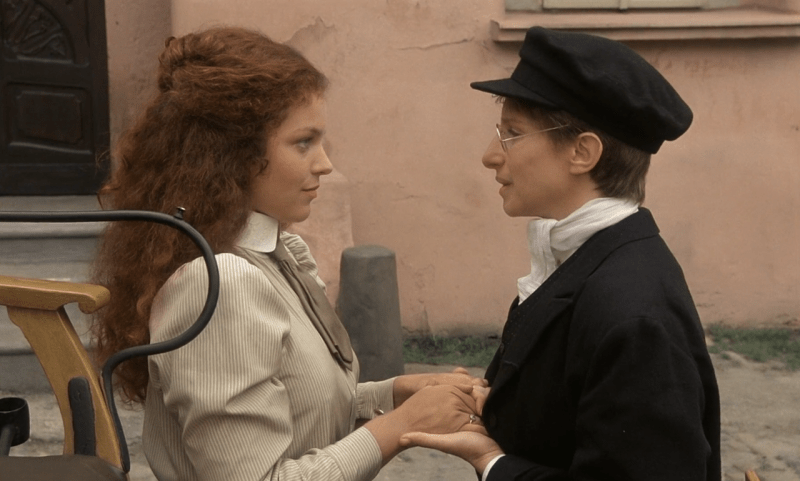
While an argument could be made that Barbra Streisand’s gender-bending directorial debut would be more applicable on a trans musical list, it still feels applicable here due to Amy Irving’s character Hadass. She might marry Yentl when Yentl is pretending to be the male Anshel, but as this marriage of necessity turns to a marriage of love for her, her feelings toward “Anshel” feel very gay. She might not totally register what makes Anshel different from other men, and yet she’s very into this difference. Of course, that difference is Anshel is a woman and they’ve been early 20th century gay married.
2001 — Karmen Geï (dir. Joseph Gai Ramaka)
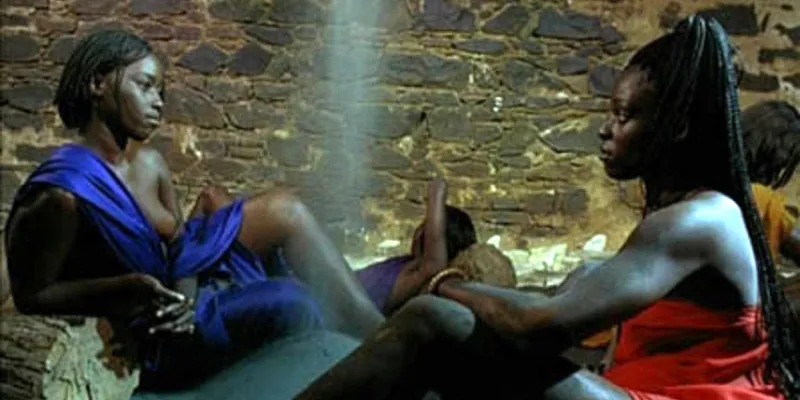
This reimagining of the opera Carmen is bursting with energy and sexuality. The titular temptress is made pansexual which underlines her freedom and offers quite a few delicious moments. The music is incredible, the visuals are stunning, and Djeinaba Diop Gai’s central performance is as magnetic as this character deserves. While the film still ends in the expected tragedy, this version more than any other seems to really respect Karmen and her sexuality.
2002 — 8 Women (dir. François Ozon)

The influence of queer icon Jacques Demy is felt in François Ozon’s film that’s like musical Clue but entirely women and French. And when I say French, I mean French. This movie feels gay and then it gets explicitly gay and then it gets explicitly gayer. By the end it’s unclear if anyone is straight! Special shoutout to Firmine Richard who is given a sad gay ballad and Catherine Deneuve whose commitment to playing gay despite suing Deneuve Magazine is ever surprising.
2002 — Chicago (dir. Rob Marshall)
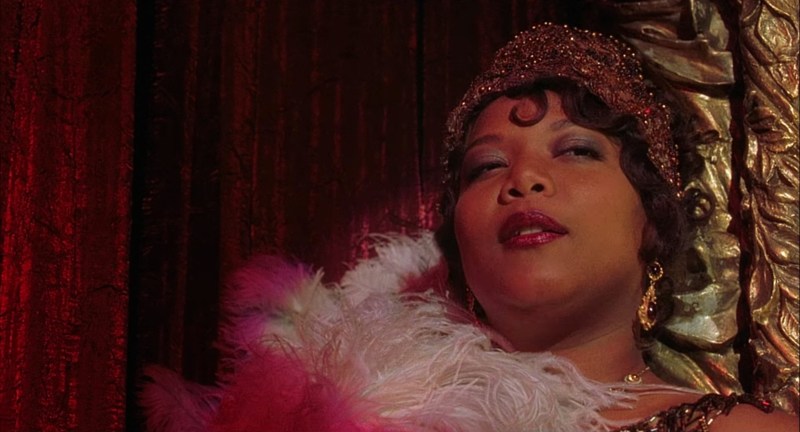
A film that certainly inspired more gay feelings than it is actually gay, this Best Picture winner is still worth noting for Queen Latifah’s coded lesbian Matron Mama Morton. I mean, she strokes her feathers while saying, “I love them all and all of them love me” — not exactly subtle! The movie does manage to remove some of the subtext by creating a fantasy sequence where she’s singing to male audience members, but we know what’s really going on. Also she calls Roxie pretty and strokes her hair before saying “I’ll take care of you” and putting a firm grip on the back of her neck. Look, this abusive quid pro quo isn’t something to romanticize, but in 2002 I did not understand the nuances of that!! I just had gay feelings!!
2005 — Rent (dir. Chris Columbus)

Rent was the first prominent queer woman stage show to get a film adaptation and while we can argue about the quality of this adaptation — and Rent itself — that alone is worth celebrating. Rent means so much to so many gays and it’s easy to see why. I mean, Joanne and Maureen! MAUREEN. Idina Menzel reprises her role from the original Broadway cast and what a joy, because of her voice and because of the way she looks in tight leather pants and a tank. “Take Me or Leave Me” is so fun especially when Tracie Thoms is standing on the stairs in her suit all gay and Idina starts crawling towards her. What a moment! What a musical! What a movie! Sort of.
2005 — The Producers (dir. Susan Stroman)

It’s unfortunate the same year that brought us objectively the biggest queer women musical also had this. Maybe this tongue-in-cheek number wouldn’t annoy me so much if this list wasn’t filled with femmes and subtext. But since it is I’m going to be a humorless lesbian and say “Keep It Gay” feels cringey two decades later especially the characterization of the butch lighting designer.
2007 — Love Songs (dir. Christophe Honoré)

This is another film that feels like part of Jacques Demy’s lineage — maybe it’s impossible to be a queer French filmmaker making a musical and not be inspired by him. But while 8 Women leaned into the farce, this movie leans into the romantic melodrama. Unfortunately, what begins as a très français throuple story turns tragic and the only remaining gay content is male. But first there’s a good song about being a couple’s third and having to manage their relationship problems!
2007 — Across the Universe (dir. Julie Taymor)

One fun thing about being gay is being obsessed with something as a kid and then growing up and meeting other gay people and realizing they too were obsessed with that same thing. One of those things for me is absolutely Julie Taymor’s Beatles jukebox musical Across the Universe. I remember my dad was thrilled that I was suddenly very into The Beatles but a bit confused why I was most into them when sung by Evan Rachel Wood. This whole movie pulsates with queer energy, and Prudence played by T.V. Carpio is explicitly a lesbian! She pines over a cheerleader in “I Want to Hold Your Hand” and is literally coaxed out of the closet in “Dear Prudence.” She eventually ends up out and proud and dating a contortionist, so a very gay happy ending indeed.
2013 — Frozen (dir. Jennifer Lee and Chris Buck)

Queers have been projecting our feelings onto Disney movies for decades, but the social media response to Frozen showed just how starved we are for some actual representation. “Let It Go” is a phenomenal coming out anthem — even if unintentional — and the reunion of ice queen Elsa (Idina Menzel again!) and her heterosexual sister felt like an allegory for many of us who had to find common ground with straight relatives. Alas, the #GiveElsaaGirlfriend campaign failed and the sequel just brought more subtext, this time in the form of love songs to Elsa’s mother. Okay fine, I guess that is pretty gay.
2014 — Girltrash: All Night Long (dir. Alexandra Kondracke)

I’m sorry, but when I think of queer women musicals, I still think of this wonderful guilty pleasure. Based on Angela Robinson’s web series Girl Trash, All Night Long (which Robinson disowned) is special for its ensemble cast of queer women favorites and the queer women crew who made it. No, it’s not a masterpiece, but it’s silly and the songs are catchy and I get “Fantasy Crush” stuck in my head at least once a month.
2015 — The Lure (Agnieszka Smoczyńska)

This genre-bending mermaid musical horror movie was likely not intended to be about a gay trans girl and her straight trans girl best friend — Michalina Olszanska and Marta Mazurek who play the central mermaids, Gold and Silver, are both cis. And yet with its literal bottom surgery and riff on The Little Mermaid — a trans girl favorite — it’s no surprise that it’s left such an impression on the community. But beyond this imposed subtext, it’s still a weird and wonderful work of queer cinema that includes a sung-through scene of lesbian fish sex that makes The Shape of Water look like Mr. Limpet.
2016 — Liberty’s Secret (dir. Andy Kirshner)
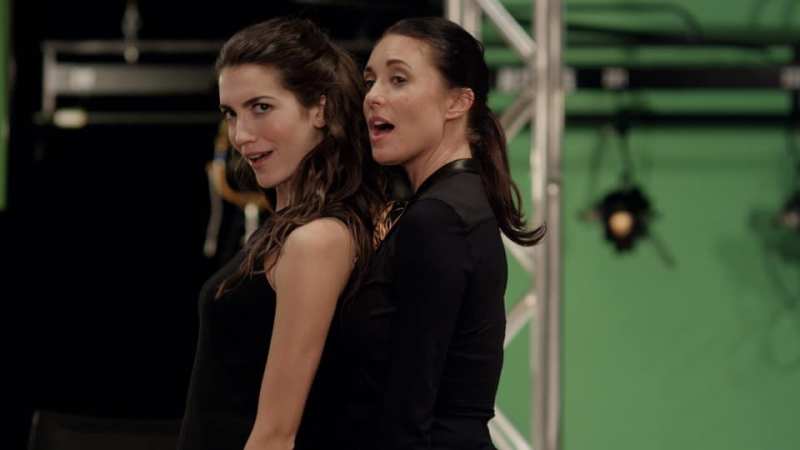
Tubi has dozens of low-budget lesbian movies you’ve likely never heard about, but this one stands out, because it’s a musical! I can’t say I recommend this tale of a preacher’s daughter who falls in love with a Republican campaign director, but I can say it could be a lot worse. Its attempts to satirize evangelicals, Fox News, and Tea Party Republicans don’t hit quite as hard as they need to, even if it is self-aware enough to be watchable. While too political to have the corny charm of Girltrash: All Night Long, this still gets points for being one of the only movie musicals to squarely be a lesbian romance.
2017 — Anna and the Apocalypse (dir. John McPhail)

It’s Christmastime, so how about a lesbian Christmas movie musical? Okay FINE only one of the characters is a lesbian, but she’s played by openly queer actor Sarah Swire! This is a zombie movie musical filled with charm and heart and even a little emotional devastation. It has a very poppy teen vibe and it charmed me completely and I think it might charm you!
2017 — Good Manners (dir. Juliana Rojas and Marco Dutra)

Some films on this list are musicals, but only a little lesbian — this is lesbian, but only a little musical. There’s just no way to define this masterpiece by genre. It’s a werewolf horror movie fairy tale that’s part romance and part mother/son tale and it’s about queer motherhood and about race and class in Brazil and that’s a lot for one movie and yet it all works? Oh yeah and there are some musical numbers. To reveal when the first one comes would be to spoil one of the film’s many twists, but it uses music the way some old Disney movies used music — just a few numbers in the emotional moments that most require breaking out into song.
2017 — Hello, Again (dir. Tom Gustafson)

Based on Michael John LaChiusa’s 1994 Off Broadway show, this series of musical vignettes about love and sex misses more than it hits. But in one number Audra McDonald and Martha Plimpton are lovers and that alone is worth watching! It’s a shame the movie as a whole isn’t stronger — if it was it would be way more popular because, again I repeat, AUDRA MCDONALD AND MARTHA PLIMPTON ARE LOVERS.
2017 — Holy Camp! (dir. Javier Ambrossi and Javier Calvo)

I want to be thorough and sell you on this wonderful Spanish musical, but I also just want you to watch it for yourself so you can experience the same surprise and delight I did. This is really one of the standouts on this list in terms of levels of queerness, quality of musical numbers, and pure exuberant spirit. It’s sacrilege that ends up feeling transcendent. It’s everything I could ever want from a queer musical! And it’s on Netflix!
2019 — Ek Ladki Ko Dekha Toh Aisa Laga (dir. Shelly Chopra Dhar)

This is the first Bollywood film to feature a lesbian romance and that is an exciting and noteworthy step towards progress. However, this film is most definitely just a step. For one, it’s not about the lesbians, but about a struggling playwright who decides to help them. The movie very explicitly is for a straight audience to teach them basic gay acceptance and it’s possibly effective in that context, but it’s not the big gay Bollywood movie we’ll hopefully have someday.
2020 — The Prom (dir. Ryan Murphy)

The Prom is noteworthy for being huge star studded Broadway adaptation not just with two queer women in the ensemble but two queer women at its center. Sure, the adults — both straight and gay male — are major characters, but the hopeful and out Emma and her closeted but aching love Alyssa are the unruly heart of the film. And they’re played by Jo Ellen Pellman and Ariana DeBose, two incredibly talented queer actors! This is a corny celebration of musicals, a corny celebration of being gay, and, as a corny gay, I’m happy to join it in celebration.
2021 — In the Heights (dir. Jon M. Chu)
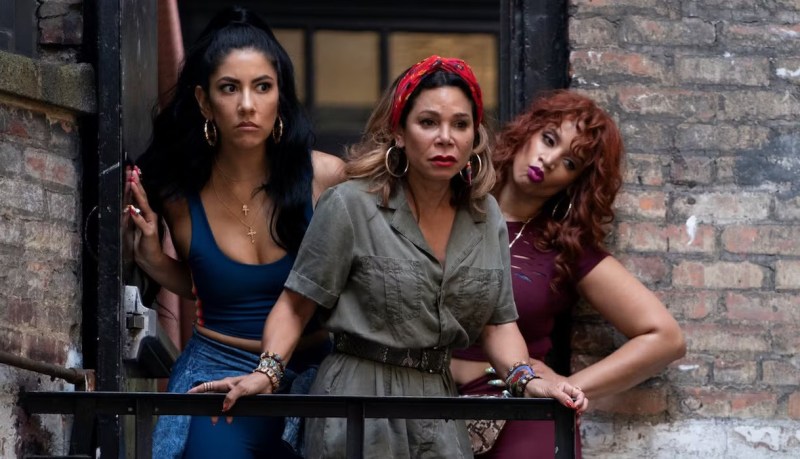
The much-anticipated In the Heights movie made several changes — for better or worse — from the stage show and one of the best was Daniella and Carla becoming lesbian partners. Played by Daphne Rubin-Vega and Stephanie Beatriz, this subtle but welcome change added some explicit queerness to a show that so many queer people already loved. It is worth noting that I talked to several people who watched the film and didn’t notice this change, so it probably could have been more explicit.
2023 — The Color Purple (dir. Blitz Bazawule)
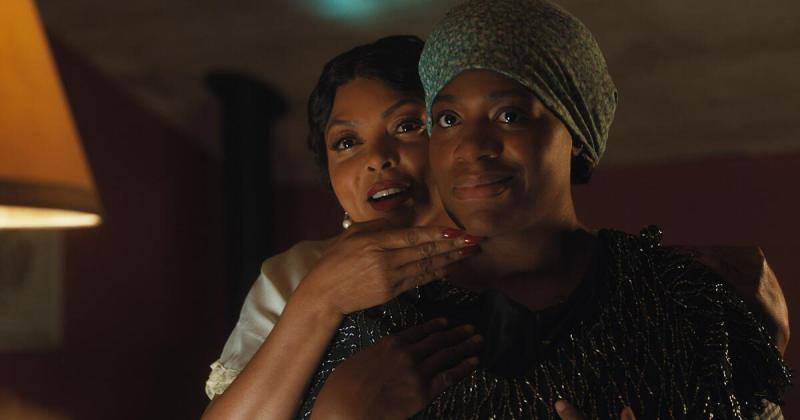
The 1985 film adaptation of Alice Walker’s classic novel minimized the romantic and sexual nature of Celie and Shug’s relationship. When I saw the Broadway revival in 2016 — starring a truly remarkable Cynthia Erivo — I was shocked that this production did the same. So when the movie was announced, like many, my question was, will this finally be the adaptation to not shy away from the novel’s queerness? Fortunately, this film, starring Fantasia Barrino as Celie and Taraji P. Henson as Shug, does make their relationship explicit. And yet, in cutting two of Celie and Shug’s four songs together, it still seems to minimize their relationship. Far from a perfect film, it was still the first major movie musical since Rent to focus so explicitly on queer women.
2024 — Mean Girls (dir. Samantha Jayne, Arturo Perez Jr.)
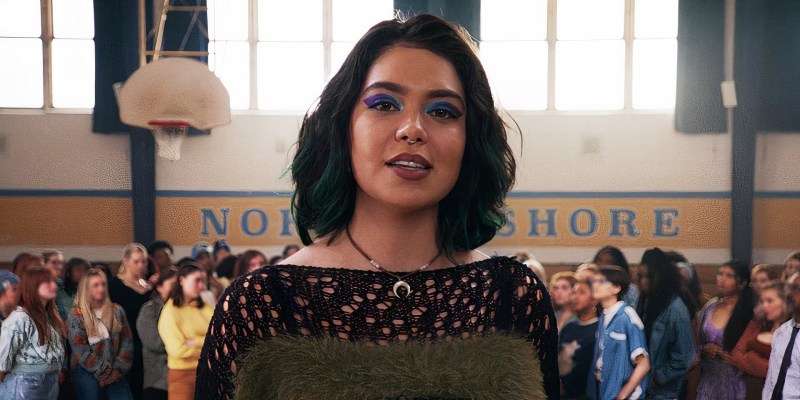
Reneé Rapp and Auli’i Cravalho confirmed themselves as absolute stars in this adaptation of the stage show that was an adaptation of the 2004 movie. And that’s about all the good I can say about it. Okay, it does also up the explicit queerness making the falling out between Cravalho’s Janis and Rapp’s Regina due to Janis’ queerness. But otherwise this film is a baffling, soulless repetition of the original movie — including a copy-pasted script — with some middling musical numbers thrown in. I know the show and this film have its fans, and I’m happy for you all! I just think Rapp and Cravalho deserve a gay movie musical worthier of their considerable talents.
2024 — Emilia Pérez (dir. Jacques Audiard)
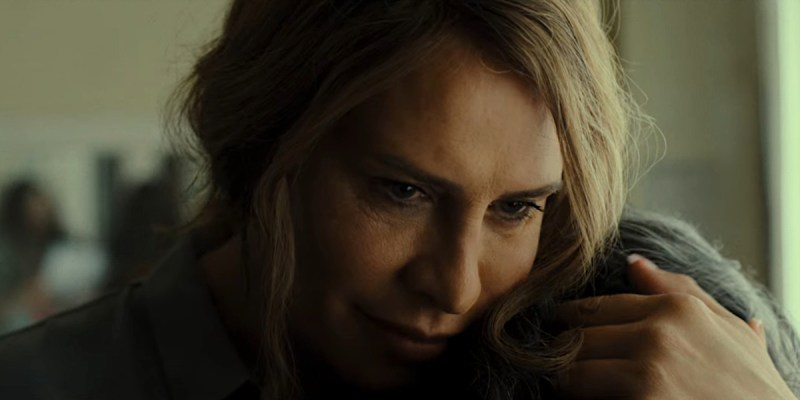
Vaginoplasty! A big budget musical with a trans lesbian titular character sounds like something I would have fantasized about half a decade ago. It’s too bad this film — a festival favorite and now an Oscar frontrunner — isn’t a better film. I could talk about the reasons its portrayal of transness falls short — and I have — but my biggest issue is the mediocrity of the music, the dancing, the staging, and the character development. The discourse around this film has already been exhausting and award season has only just begun. But I’m mostly resigned that this is what cis people want to see from trans stories, so this kind of story will continue to get made. Hopefully, someday soon some trans filmmakers get the chance to make movie musicals that are better.
2024 — Wicked (dir. Jon M. Chu)
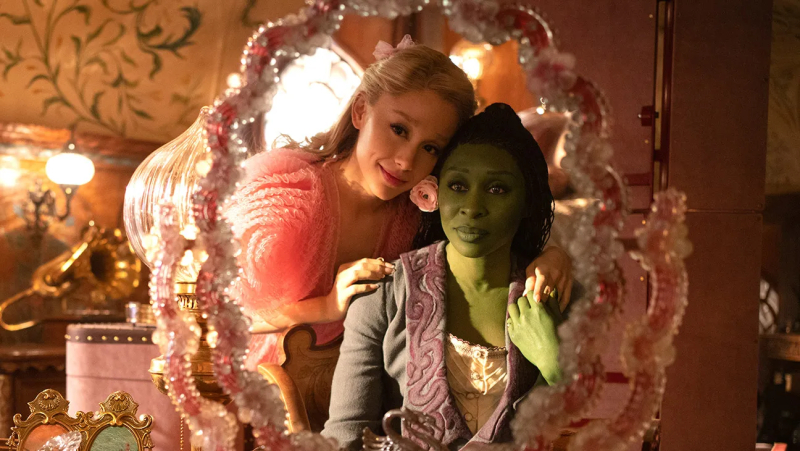
While not one to give too much credit to subtext in the year 2024, I would argue the musical Wicked is pretty damn overt. First of all, “What Is This Feeling?” is pointedly a riff on a romantic song. Second of all, the entire Elphaba/Glinda relationship feels like lesbian college student and bicurious roommate fall in love but when the lesbian is like let’s be lesbians together, the roommate gets scared and runs back in the closet. While, sure, I would have welcomed an Elphaba/Glinda kiss added to the movie, their relationship feels so true to a college-aged tortured queer sexuality. With a largely queer cast, including Cynthia Erivo as Elphaba, overtly gay side characters, and an extended dance sequence between Elphaba and Glinda, the movie feels even queerer than the already gay show.
2025 and beyond — The Future!
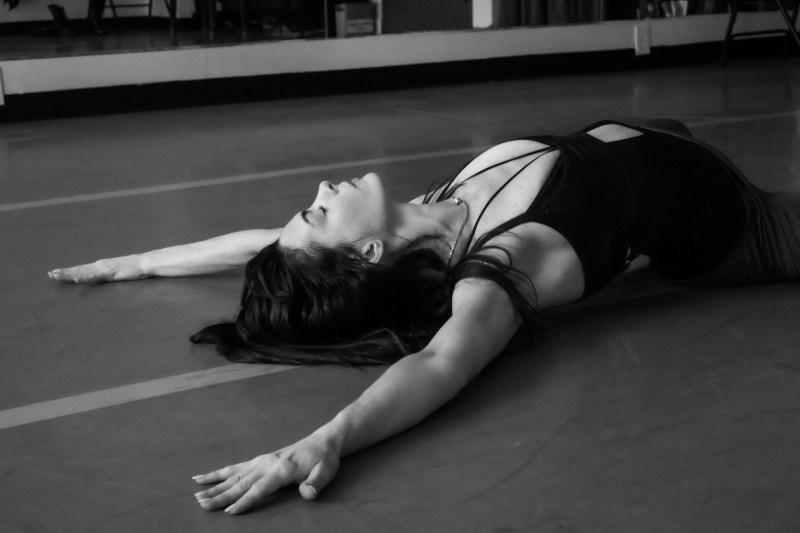
So what’s next? Well, of course, next year brings Wicked: Part Two, including new songs which could make the whole thing even gayer. (But at the very least we’re getting “For Good” !!) There’s also finally an adaptation of lesbian masterpiece Fun Home in the works from stage director Sam Gold. (Initially, I wasn’t sure about the casting of Jake Gyllenhaal, but I’ve come around!) Frozen songwriters Kristen Anderson-Lopez and Robert Lopez were previously announced to be working on an adaptation of The Prince and the Dressmaker, a transfeminine lesbian fairy tale, but there hasn’t been any recent word so this might have been a pandemic and/or strike casualty.
The most exciting film, set to come out as early as next year, is Mother Mary, a musical starring Anne Hathaway, Micaela Coel, and Hunter Schafer with music by Charli XCX and Jack Antonoff. It’s about the relationship between a pop star and a dress designer and the internet has assumed that means romantic relationship and I hope they’re right.
Then there are stage shows that aren’t currently being adapted but could be! Maybe we’ll get movies of jukebox musicals Head Over Heels or Jagged Little Pill. (Actually, turning Head Over Heels into a movie with Peppermint is a dream of mine…) Or maybe less successful — and arguably less good sorry! — musicals like Lempicka or The Lonely Few will be adapted. Or maybe someone will rescue one of my very favorite musicals from obscurity and give Miss You Like Hell the audience it deserves.
And, finally, it’s worth noting that some of the best entries on this list came from independent filmmakers who weren’t afraid of the musical genre despite their limited resources. This is certain to continue as more and more queer creators are given opportunities — or create opportunities — even on a small scale. Imagine what so many queer creators will do with the genre in the years to come! The movie musical may have excluded queer women for most of the 20th century. But we’re included now — we’re including ourselves now — and, to quote Wicked, if we’re flying solo, at least we’re flying free.








Comments
I feel like Prudence from Across the Universe deserves a spot on this list!
Omggggg YES how could I forget!! Adding now.
Love you for that ♥️
I was OBSESSED with it as a kid. And a couple years ago remembered that and thought hmm must’ve been because of Evan Rachel Wood. I can’t believe I forgot about Prudence?!? Maybe a rewatch is in order… Also wild what our gay child brains pick up on and block out.
I wore that dvd out as a kid. Such a sexy movie. It deserves a rewatch for sure, Julia Taymor has been talking about a sequel!
I wore that dvd out as a kid. Such a sexy movie. It deserves a rewatch for sure, Julie Taymor has been talking about a sequel!
Why no Hedwig?
OMG YES HEDWIG!
I love Hedwig so much but trans musicals would be a different list! Obviously there is sometimes overlap, but like our larger film lists I tried to distinguish between queer cis and trans people vs. trans stories where they’re into men.
But I have an essay I’ll hopefully be writing for Hedwig’s upcoming 20th anniversary…
As a lesbian who loves musicals, I really appreciate this list. I also had a lot of gay feelings about Catherine Zeta-Jones in Chicago (and CZJ in general).
I have several friends whose entire lives were changed because of CZJ in Chicago. hahaha
DREW!!!!!!!!!!!!!!!
Well, “The Lure” by Agnieszka Smoczyńska is queer as f*ck. On so many levels! Yeah, the mermaid has sex with the policewoman, but there is so much more than that. The mermaid bodies are queer bodies, of course, and the patriarchal reality can’t cope with that. It cannot end well, but really, how heterophobic this film is!!
I hope the Criterion’s translation is decent: the lyrics are so, soooo good.
Omg I LOVED The Lure! I don’t remember either of them having sex with a woman…? But I haven’t seen it since coming out! And I am learning that apparently I just watched a bunch of queer content before coming out and did not acknowledge in my brain that it was queer !!! lmao
Yeah, there is a sex scene, and the policewoman is sitting on the mermaid’s tail, all shining and wet, and they’re singing ¯\_(ツ)_/¯
And now I need to watch it again, too!!!
Ahhh this is truly blowing my mind. I’ll have to rewatch and then edit this post. Thank you!
Oh, I have to rewatch 8 women! My mum (who’s usually a very straight ally) and me went to see it at the cinema years ago and she fell head over heels for Fanny Ardant. It was so delightful. I oth think the movie would be worth it just for the let-your-hair-down-scene between Emmanuele Béart and Catherine Deneuve.
My mom just got 8 Women out of the library by coincidence, I hadn’t planned on watching it with her, but maybe it’s destined to be a straight mother/gay daughter bonding experience?
Oh, please do and tell me how it went.
I love that you included Love Songs! tbh the movie is very mediocre but I love the music and still have the soundtrack on my Spotify playlists. Also yes to Miss You Like Hell! I’d love an adaptation of it :)
What about “Jamie and Jessie Are Not Together,” the Wendy Jo Carlton directed musical?
But, ohhhhh, I am so happy to see “Anna & The Apocalypse” on here!
Great list, to which I will add The Two Sides of the Bed, a Spanish musical and a sequel to The Other Side of the Bed. I believe the original includes some ‘pretending to be lesbian’ content and centers on straight men, in the sequel their girlfriends are secretly in love with each other, and it’s wonderful.
I am thrilled that you wrote this! There are some things that I’ve never heard of that I look forward to checking out.
I am glad to hear your review of Holy Camp. A few months ago my wife selected it for us to watch (we never agree on movies!) She suspected it was gay from a picture she saw, but we started watching it and didn’t get through the opening old man teen angel scene before we thought it might be a for-real Jesus movie and turned it off. Now that I know it gets better, we will give it another chance!
We are about to start The Prom shortly. I saw it on Broadway and loved it!
My wife is really happy that Love Songs made it on to this list. It is her favorite movie and she is always talking about how great it is
Oh I LOVE this. I appreciate the inclusion of both actual lesbian content and “classics of subtext”, it was both thoughtful and funny.
I’m also a completionist who loves to go down research rabbit holes, so I compiled a list of every movie I could find that wasn’t already on this list or mentioned by someone else in the comments. I have seen ZERO of these movies and can’t attest to their quality, but here we go anyway! Listed roughly in order of how well known they are and/or how interesting they sound to me (spoiler- a LOT of these are obscure sci-fi/horror comedies).
Becks- A 2017 musical movie based on the real life of the folk singer Alyssa Robbins, featuring Hayley Kiyoko!
Steven Universe the Movie- A feature length continuation of everyone’s favorite gay space rock cartoon.
Absolute Beginners- An extremely 80s ensemble musical starring David Bowie with a lesbian character played by Eve Ferret.
Dyke Hard- A B-Movie inspired Swedish musical comedy about a lesbian rock band trying to get to a battle of the bands while “a mysterious billionaire with an army of ninjas, cyborgs and roller derby girls is doing everything to stop them”.
Isle of Lesbos- A 1997 sci-fi musical about a bride with cold feet escaping to a “lesbian dimension”, pursued by an evil conversion therapist named Dr. Sigmoid Colon.
Liberty’s Secret- A politician running on a conservative platform falls in love with her female campaign manager. Drama!
Spidarlings- A “queer body horror punk musical” about a punk couple fighting eviction and getting a “mysterious pet spider” that one reviewer described as “incoherent camp” and “the most bizarre experience I’ve ever had watching a movie”. Promising!
Fruit Fly- A musical film directed by H.P. Mendoza about a Filipina American performance artist moving into a queer artists’ commune.
Dominatrix Waitrix- Not-quite-feature-length at 45 minutes but sounds too good not to include. A “queer sci-fi sex romp” about robot waitresses rebelling via kink.
Fishnet- A campy musical comedy about a lesbian burlesque dancer couple on the run from the mob.
Karmen Geï- A Senegalese adapatation of the opera “Carmen” with a bisexual protagonist. Her lesbian lover dies in the end which is a bummer!
W- An Indian musical thriller centered around a lesbian and her straight best friend trying to organize a “Freedom Concert”.
Cupcake: A Lesbian Zombie Musical- This one’s from Australia! A lesbian couple fighting zombies (who wear feathered showgirl costumes I guess?) and sing about it.
Queer Duck the Movie- Feature length adaptation of a 2000s gay animated webseries. Mostly about gay male characters but I think the duck has a lesbian sister?
Teenage Tupelo- A musical soundtracked by the band Impala about a young single mother enlisting the help of a lesbian gang.
Ghost In A Teeny Bikini- The titular Ghost in a Teeny Bikini helps a heiress find her uncle’s killer and seduces her in the process.
Jesus Christ Vampire Hunter- Another sci-fi/horror musical involving priests summoning Jesus to fight vampires that have been preying on the lesbians of Ottawa?
Superstarlet A.D.- Yet another campy sci-fi, this time with post-apocalpytic factions of women hunting for a mythical burlesque film.
Poultrygeist- A horror musical involving lesbian animal rights activists protesting the building of a fried chicken joint on a “Native American Burial Ground”; the synopsis I read sounds spectacularly racist so gonna skip this one
This is amazing. Thanks for compiling this!
I’ve seen a handful of these. Jesus Christ Vampire Hunter didn’t have enough lesbian or musical content to make the list. And I pointedly left off Spidarlings and Poultrygeist… Poultrygeist especially I really recommend NOT watching. lol
But I probably should’ve included Karmen Geï!! I love that movie (it’s 94 on our all time list). I guess my thinking was more along the lines of classic break out into song musical rather than something more operatic, but that wasn’t a conscious distinction it just didn’t come to mind and should have!
I love the completionism! Liberty’s Secret is terrible, but absolutely belongs here!
I’ve seen Becks and it’s not a bad movie, but more in the ‘music’ genre than an actual musical.
Keen to check out some of the others.
I love Spidarlings, it’s an ultra low budget queer, punk, horror musical directed by a trans woman director. It’ just so unique, irreverent and strange. The songs are all surprisingly catchy as well. Not a film for everyone, but I highly recommend it.
Drew I would *love* to see you profile/interview queer Broadway actresses, like Ariana DeBose, Lauren Patton, the queers of the Fun Home cast, etc!
Drew! Thank you so much for including Calamity Jane. I’ve never met another queer who mirrors my deep appreciation for the film. It was awesome to see it featured! I also completely agree with the negative aspects you voiced and was grateful to see those included.
Yes!! Calamity Jane is fabulously queer! Doris Day and Allyn McLerie were delightful together. There was soooo much subtext—if you can even call it that when it’s so blatant. I really wish someone would do a remake, be it stage or screen, to embrace the queer story it deserves.
I’m just here to say that Miss You Like Hell is an incredible musical, and I want to see it every day. I’m writing a queer lady musical, and maybe one day it’ll be turned into a movie musical. I also have a concept for a queer lady movie musical, and I think it would work really cool animated. Disney, want to pick up my girl-on-girl movie musical?
How could you forget about Yentl? It has a LOT of subtext and an inherently queer storyline. Sure, I know she’s presenting herself as Anshel at the time, but Amy Irving falls in love with Barbra Streisand! Also, Yentl’s desire for Avigdor while living as Anshel is very queer, even if the character is straight. I just… i can relate to this movie, and to Yentl’s feelings so much as a young lesbian, even if not the exact circumstances. One of the things that made me cry at how much I related to it the first time I saw it was there’s a scene towards the end… I’m majorly paraphrasing here because it’s been a while, but Avigdor is like “You couldn’t possibly understand! What do you know about love? You’re just always in your books!” And Yentl wants to scream “I feel all of these things! I’m so TIRED of people seeing me as someone who doesn’t, but I can’t say anything, I have to just bear people’s assumptions and perceptions of me because my love is one about which I can never tell you.” Okay, so clearly I’m projecting here and it doesn’t say it quite like that, but this is the implication in the movie. A gender bending movie AND a movie about experiencing sexual attraction and not being able to speak about it, until the end when she finally does. And then goes off to find her own destiny, suddenly with “a whole sky-full” of possibilities open to her now that she’s no longer cramped in the closet.
And if we’re including Frozen on the basis of having a “coming out anthem”, then Yentl definitely counts. Even if we ignore the giant ball of queer subtext that is the rest of the movie, just for the song “No Matter What Happens” alone, it should be on this list. It is literally a coming out anthem! https://m.youtube.com/watch?v=y0SRq9JT2uw “There’s someone who must hear the words I’ve never spoken. Tonight if [she] were here, my silence would be broken! I need [her] to touch me! To know the love that’s in my heart the same heart that tells me to see myself, to free myself, to be myself at last! For too many mornings, the curtains were drawn. It’s time they were opened to welcome the dawn!”
And that’s not even talking about the other song lyrics — like one that always got to me (and still does) from Will Someone Ever Look at Me That Way? “Do my eyes forget themselves
And do I ever look at [her] and smile in such a way that what I’m feeling shows? Sometimes I have the feeling everybody knows. And even though it’s crazy still I can’t help wondering if I’ll ever live to see the day when by some miracle of miracles [she’ll] turn around and look at me that way!“
I promise I’m not trying to be rude, it was a lovely list with lots of musicals I’d like to check out, I’m just really passionate about Yentl!
Thank you for being passionate about Yentl. Four years later, with an updated list I GET IT.
Were the World Mine! Mostly gay male but includes queer gal content, though it exists because of a spell. Of course, there’s also the main girl character identifying as “heteroflexible”?? https://www.youtube.com/watch?v=yLJe1QakzX4&ab_channel=ciwciwdotcom
Love this list. Humbly adding in Transparent the Musicale Finale, tho that’s arguably a television Series instead of a stand-alone film so maybe doesn’t meet the criteria. But – super queer! Super musical! Judith light torch songs grieving for her trans exwife via shoewear metaphors + tapdancing iterations of childhood selves! Everyone else’s plot lines! The joyocaust number at the end! Which is just a dance-through-the-pain kind of queer dance party in the woods, all the characters’ exes and loved ones past and present grand jete-ing around, which is like, the gayest possible thing?